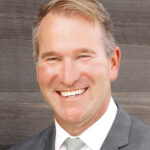Summary:
Todd came out at age 18, but it didn’t stop there. As part of an invisible minority, he finds himself having to come out again and again, in the workplace and beyond, explaining himself to strangers and coworkers in many teachable moments
Thuy
In your conversations with top executives, a lot of them are perhaps dealing with these issues in their own lives - a child who has just come out or a child who reveals that he or she wants to be a different gender. How does this play into your conversations with them and your ability to connect with them?

Todd Sears
Well, LGBT folks are in invisible minority and you don't know who we are until we let you know who we are unlike gender and often, ethnicity. It is not something that we wear walking into a room, and for that reason, we do have to come out and by coming out, you're revealing something about yourself and it actually takes a huge amount of self-knowledge and courage for LGBTQ people to come out, and it's a constant process, by the way; people have to come out every day again and again. I first came out when I was 18 and yet, I'm now 45 and I still have to come out on a regular basis. People see a wedding ring and say, "Well, where's your wife?" I have the opportunity of the challenge or the opportunity to say, "Well, my partner Brian is not here with me. He's great, thanks for asking," and make that a teachable moment, but equally, people have to come out as allies, and so you mentioned children and family. The LGBT leadership opportunity really does connect much, much more broadly than just the corporate space with a board room, it does connect to families. So many leaders, not just LGBT leaders, but allies have gay children, lesbian children, trans children, gender non-conforming children, brothers, sisters, mothers, fathers, and that creates a whole new level of connectivity and also passion for this topic and for what companies and leaders can do to change the world because it matters to them, not just because this is a huge market or a tremendous talent opportunity, but it matters to them because it's literally in their home. A great example is Rich Jeanneret who is the vice-chair of EY who's on our leaderships board. Rich has a transgender son and he shared at several of our summits over the years, both the conversations that he and his wife had to have to understand what that meant when his then-daughter, now son told him that they were going to be transitioning, all the way through to what that meant to him as an ally within EY. He was an executive sponsor to Pride Network, but he really never thought about it as a parent of a trans kid, and once his son transitioned, he had to come out at work again and he had to come out at work as the parent of a trans child and actually had to change the photo on his desk from having a female to a male, and he shared, actually, what the impact of that was, which was that for the first time in his entire life as a straight white cisgender male who as he said had power and has power in the organization, he never really experienced discrimination, but seeing the discrimination that his son felt and went through as part of this process was incredibly eye-opening, it increased tremendous levels of empathy in him, and as I said, that really does tie back to what I think we achieved with Out Leadership.
Related Posts

You Can’t Please Everyone
Vy Tran learned a tough lesson as a first-time manager – you can’t please everyone. Having to “drive accountability” while also being a self-described “people pleaser” required Vy to dig deep and re-think how she communicates with her team.

Failing Forward
Failing forward is an essential skill not just at work but in life. For Vy Tran, learning from her mistakes has made her a more effective and influential leader.

